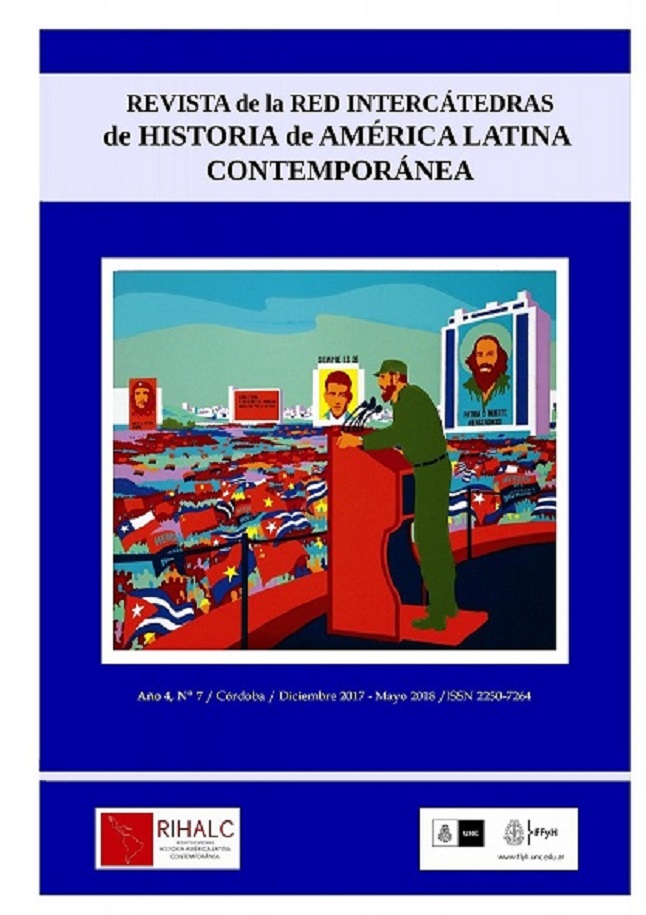Culture during the construction of the new State in Cuba (1959-1961) Intellectuality and politics at the beginning of the Revolution
Keywords:
Cuban Revolution, Culture, IntelectualsAbstract
The cultural policy of the Cuban Revolution between 1959-1961 was characterized by the coexistence of tendencies, the diversity regarding the use of aesthetic forms, the appeal to intellectuals for a predominant participation in the culture organization -even when they had not actively contributed throughout the insurrectional process-, a democratization of the access to culture, and a gradual inclination to the centralization of existent institutions carried out by the State. The analysis of primary sources like cultural journals Lunes de Revolución, Casa de las Américas, Verde Olivo and Cine Cubano, as well as the study of the grounds of Revolutionary Government laws that created Consejo Nacional de Cultura (National Council of Culture), Casa de las Américas institution, Imprenta Nacional (National Printing Press) and Instituto Cubano de Artes e Industrias Cinematográficas (Cuban Institute of Arts and Cinematographic Industries), allows stating that these features were established as of January, 1st 1959, years before the well-known Fidel Castro´s “Palabras a los intelectuales” (Words to Intellectuals) that systematized and made the cultural policy performed by the Revolution in its beginnings explicit. The wide call accomplished by the revolutionary leadership caused intellectuals from diverse, disperse and in some cases opposed groups to be integrated to the official cultural field and to provide it a heterogeneity that became a peculiarity of revolutionary culture.
Downloads
References
Castro, Fidel (1961): “Palabras a los intelectuales”, Departamento de Versiones Taquigráficas del Gobierno Revolucionario [En línea]. Consultado el 13 de abril de 2017. Disponible en línea en http://www.cuba.cu/gobierno/discursos/1961/esp/f300661e.html
Dalton, Roque et all (1967): El intelectual y la Sociedad, Siglo XXI, México.
Estupiñán, Leandro (2015): Lunes: un día de la Revolución Cubana, Dunken, Buenos Aires.
Fernández Retamar, Roberto (1967): “Hacia una intelectualidad revolucionaria en Cuba”, Casa de las Américas N°40, enero, pp. 4 a 18.
Gilman, Claudia (2003): Entre la pluma y el fusil. Dilemas del intelectual revolucionario en América Latina, Siglo XXI, Buenos Aires.
Kohan, Néstor (2006): “Pensamiento Crítico y el debate por las ciencias sociales en el seno de la Revolución Cubana”, Crítica y Teoría en el pensamiento social latinoamericano, CLACSO, Buenos Aires. pp. 389 a 435.
Martínez Alonso, Gleydis (2008): “Dialéctica del cambio. La huella de la revolución en las instituciones culturales cubanas. 1959-1962”, Perfiles de la cultura cubana [En línea], Revista del Instituto Cubano de Investigación Cultural Juan Marinello, N° 1, enero-abril. Consultado el 13 de abril de 2017. Disponible en línea en http://www.perfiles.cult.cu/article.php?article_id=229
Martínez, Heredia, Fernando (2011): “La imprescindible tarea de recuperar la memoria”, La Jiribilla [En línea], Nº 530, Año X, La Habana. Consultado el 13 de abril de 2017. Disponible en línea: http://www.lajiribilla.co.cu/2011/n530_07/530_13.html
Martínez Pérez, Liliana (2006): Los hijos de Saturno. intelectuales y revolución en Cuba, FLACSO-Porrúa, México.
Pogolotti, Graziella (2006): Los polémicos sesenta, Editorial de Letras Cubanas, La Habana.
Rama, Ángel (1971): “Una nueva política cultural en Cuba”, Marcha, N° 49, Marcha, Montevideo, mayo, pp. 47 a 68.
Downloads
Published
How to Cite
Issue
Section
License
Aquellos autores/as que tengan publicaciones con esta revista, aceptan los términos siguientes:
- Los autores/as conservarán sus derechos de autor y garantizarán a la revista el derecho de primera publicación de su obra, el cuál estará simultáneamente sujeto a la Licencia de reconocimiento de Creative Commons que permite la libre distribución con mención de su(s) creadores, no permite el uso comercial ni las obras derivadas. Los autores, al enviar el artículo, acuerdan publicarlo bajo esta licencia..
- Los autores/as podrán adoptar otros acuerdos de licencia no exclusiva de distribución de la versión de la obra publicada (p. ej.: depositarla en un archivo telemático institucional o publicarla en un volumen monográfico) siempre que se indique la publicación inicial en esta revista.
- Se permite y recomienda a los autores/as difundir su obra a través de Internet (p. ej.: en archivos telemáticos institucionales o en su página web) después del proceso de publicación.



